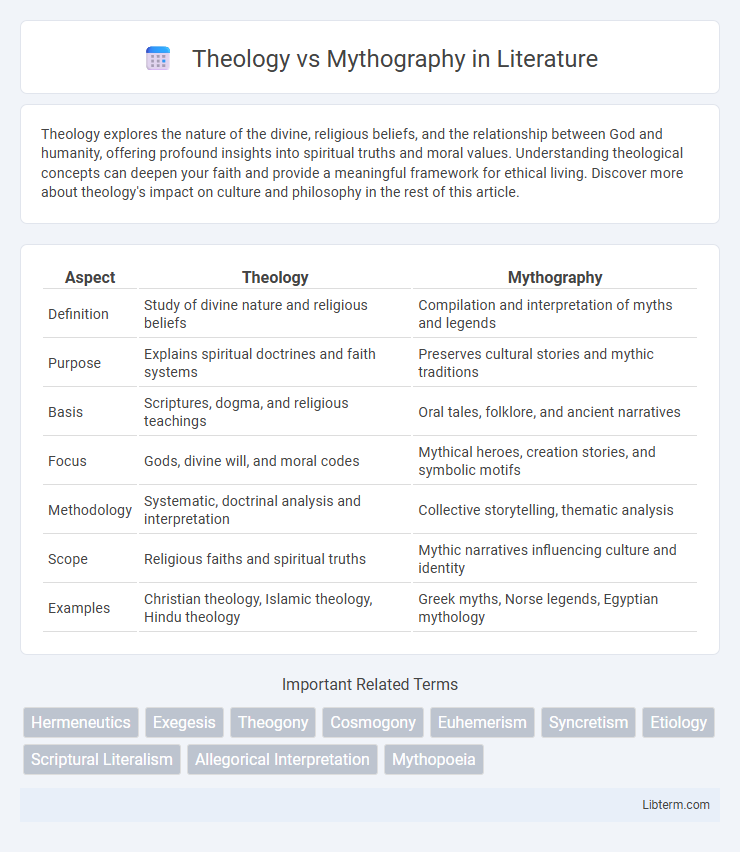Theology explores the nature of the divine, religious beliefs, and the relationship between God and humanity, offering profound insights into spiritual truths and moral values. Understanding theological concepts can deepen your faith and provide a meaningful framework for ethical living. Discover more about theology's impact on culture and philosophy in the rest of this article.
Table of Comparison
| Aspect | Theology | Mythography |
|---|---|---|
| Definition | Study of divine nature and religious beliefs | Compilation and interpretation of myths and legends |
| Purpose | Explains spiritual doctrines and faith systems | Preserves cultural stories and mythic traditions |
| Basis | Scriptures, dogma, and religious teachings | Oral tales, folklore, and ancient narratives |
| Focus | Gods, divine will, and moral codes | Mythical heroes, creation stories, and symbolic motifs |
| Methodology | Systematic, doctrinal analysis and interpretation | Collective storytelling, thematic analysis |
| Scope | Religious faiths and spiritual truths | Mythic narratives influencing culture and identity |
| Examples | Christian theology, Islamic theology, Hindu theology | Greek myths, Norse legends, Egyptian mythology |
Defining Theology and Mythography
Theology is the systematic study of the nature of the divine, religious beliefs, and spiritual doctrines, often grounded in sacred texts and faith traditions. Mythography involves the compilation, interpretation, and analysis of myths, focusing on cultural stories and symbolic narratives rather than doctrinal truth. While theology seeks to explain and understand divine realities, mythography explores the mythic structures and functions within human societies.
Historical Origins of Theology and Mythography
Theology originated as a systematic study of divine nature and religious beliefs rooted in ancient civilizations such as Mesopotamia, Egypt, and Greece, where early philosophers like Plato and Aristotle shaped its foundations. Mythography emerged from oral traditions and narrative practices of prehistoric cultures, compiling myths that explained natural phenomena and human experiences before formal religious doctrines were established. Both disciplines reflect humanity's attempt to understand existence, with theology emphasizing doctrinal truths and mythography preserving cultural storytelling and symbolic meanings.
Core Principles of Theology
The core principles of theology center on the systematic study of the nature of the divine, religious beliefs, and the relationship between God and humanity, emphasizing doctrinal consistency and spiritual truths grounded in sacred texts and traditions. Mythography, in contrast, involves the collection and interpretation of myths as cultural narratives without necessarily asserting their divine truth or doctrinal authority. Theology prioritizes faith-based knowledge and ethical implications, while mythography focuses on symbolic storytelling and mythic structures within societies.
Fundamental Approaches in Mythography
Mythography fundamentally approaches narratives as symbolic frameworks that explain cultural origins, values, and cosmic order, contrasting theology's focus on divine nature and religious truths. It employs comparative analysis, tracing mythic themes across cultures to reveal shared archetypes and sociocultural functions. Emphasizing narrative structure and metaphor, mythography deciphers myths as dynamic stories encoding human experience rather than literal divine accounts.
Theology: Interpreting Sacred Texts
Theology involves the rigorous interpretation of sacred texts to uncover divine truths and moral guidance within religious traditions. It employs hermeneutic principles and historical context analysis to deepen understanding of doctrines and spiritual teachings. This discipline seeks to bridge faith with reason, ensuring sacred scriptures remain relevant to contemporary believers.
Mythography: Analyzing Myths and Narratives
Mythography examines myths and narratives as cultural texts that reveal ancient societies' worldviews, values, and existential questions through symbolic storytelling. Unlike theology, which seeks doctrinal truths and divine revelation, mythography prioritizes the historical, psychological, and literary contexts of myths, analyzing their function, evolution, and transmission. This approach highlights myth as a dynamic narrative framework that shapes identity, morality, and cosmology across civilizations.
Intersection and Divergence of Theology and Mythography
Theology and mythography intersect in their exploration of divine narratives and sacred traditions, with theology emphasizing doctrinal truths and systematic beliefs, while mythography focuses on the symbolic and narrative forms of myths across cultures. Both disciplines analyze stories that shape religious worldviews, yet theology often seeks to establish faith-based truths, whereas mythography interprets myths as cultural expressions reflecting human experience and collective values. Divergence arises as theology prioritizes revealed truths and spiritual authority, contrasting with mythography's comparative and literary approach to mythic symbolism and origin stories.
Theology vs Mythography in Modern Scholarship
Modern scholarship differentiates theology as the systematic study of divine nature and religious beliefs grounded in doctrinal traditions, whereas mythography examines myths as cultural narratives reflecting societal values and collective imagination. Theology employs doctrinal analysis and historical context to interpret sacred texts, while mythography utilizes literary and anthropological methods to analyze mythic structures and functions within cultures. This distinction allows scholars to evaluate religious phenomena both as faith-based systems and as mythic constructions shaping human experience.
Impacts on Culture and Society
Theology shapes culture and society by providing structured beliefs and ethical frameworks that influence laws, rituals, and social norms, often reinforcing communal identity and moral codes. Mythography preserves and interprets traditional stories, enriching cultural heritage and collective memory while inspiring artistic expression and informal moral lessons. Both disciplines impact societal values, but theology typically formalizes doctrines, whereas mythography fosters narrative diversity and symbolic meaning.
Future Directions in Theology and Mythography Studies
Future directions in theology and mythography studies emphasize interdisciplinary approaches integrating digital humanities and cognitive science to analyze religious narratives and mythic symbols. Emerging research focuses on the evolving role of myth in contemporary theological frameworks, exploring how mythographic methods can enrich theological interpretation and expand understanding of sacred texts. Advances in artificial intelligence and data analytics are expected to transform the study of myth and theology by enabling large-scale textual analysis and comparative mythological research.
Theology Infographic

 libterm.com
libterm.com